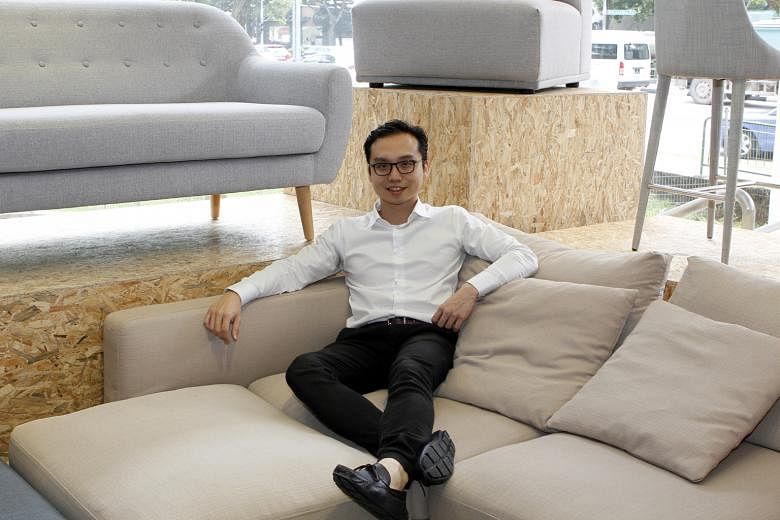Developing Enterprise Resource Planning (ERP) software from scratch is no mean feat. These are highly complex applications that collect and interpret a wide variety of information, and use it to manage business activities.
It is even more daunting for firms not in the software field. But local furniture seller Castlery did it and its efforts are now paying off.
When the start-up began selling furniture online in 2013, it also began developing its own ERP software to manage the supply chain.
"There was no off-the-shelf software that allowed everything to flow efficiently," said co-founder Declan Ee, 33.
The company tried tapping existing software systems but found that they were either glitchy or did not meet its needs.
For example, sales would sometimes not be recorded correctly in the accounts, and an employee would have to manually check and update a spreadsheet.
It took 10 to 15 employees nine months to develop Castlery's own system that manages information from a variety of sources such as warehouses, back-end accounts and the consumer-facing website.
Now, Mr Ee can track the real-time inventories to predict when stock is running low and when they need to resupply. Customers also have access to "lead-time" information on the website, so that they can estimate how long it will take for an item to be ready.
Castlery aims to plug the gap between the mass market and the upmarket by selling well-designed, quality furniture that will not break the bank. A non-leather sofa costs between $700 and $1,500, while full leather ones go for about $2,000.
The idea for Castlery came about after Mr Ee and co-founder and chief executive officer Fred Ji both completed the arduous process of setting up their homes.
"Buying furniture in Singapore is very binary - you either have Ikea or a $4,000 sofa," said Mr Ee, who used to work in the finance sector in the United Kingdom.
They both wanted alternatives to the usual routes, so Mr Ee bought furniture from the UK and shipped it back to Singapore. He spent less than $15,000 for about seven pieces, inclusive of shipping. Mr Ji, meanwhile, sourced for furniture directly from factories.
"At that time, we both found great furniture at great prices," said Mr Ee. "We thought, maybe we could try this in Singapore."
Together with co-founder and chief technology officer Zhou Zhi Wei, they set up a website in 10 days just to test the waters. Initial funding of about $100,000 came out of the founders' pockets.
"I remember that after a few days, someone bought a light bulb, and we were very excited," recalled Mr Ee. "And two weeks later, to my great surprise, someone actually bought a sofa without seeing it."
In 2014, as the company slowly grew, they rented a 3,000 sq ft space in an Ubi warehouse for $900 a month, to serve as a showroom-cum-storage space.
In the middle of that year, they decided to ramp up operations, and invested $1 million of their own money into acquiring the supply chain from the start to the end. It was also then that they brought co-founder and chief operations officer Travers Tan on board.
Then, the team began visiting factories to source for partners. In total, they visited between 500 and 600 factories in a period of six to nine months, in places such as China, Malaysia, Vietnam and Turkey.
They also began to expand their team, and to hire in-house designers to create their own products.
Last year, they moved into a 7,000 sq ft showroom in Alexandra Road, and now have a workforce of about 40 people.
The company's move to develop a bespoke ERP system has been key to its success. Mr Ee said: "All this results in better productivity internally, and we can pass the savings on to our customers."
Currently, about 80 per cent of their catalogue is designed in- house, and he is aiming for it to be 100 per cent.


